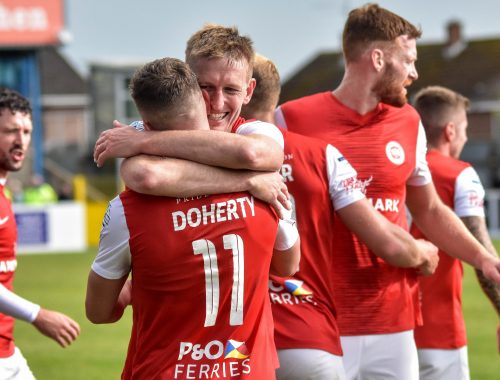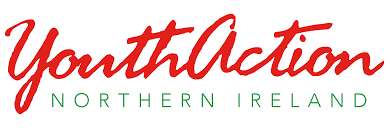
Securing a Placement: An Observation in Timing and Luck

As someone who has been keen to work in the film industry for a long time, I saw the work-based module of my degree as a great opportunity to begin that process. Brooks and Youngson (2016) determine that having relevant experience will make me look more attractive to future employers, so this opportunity will certainly give me a leg up. I was willing to take a placement in any area available. I believed it was important to not set high expectations for what my placement would involve. That could lead to disappointment and limit my enthusiasm to truly soak up any experience I was able to secure. However, I am very aware of the difficulties of entering this industry and I knew they were something that would be difficult to avoid.
I had expectations that any placement I secured would be an observational opportunity as well as carrying out smaller unwanted tasks. I was then surprised as my secured placement involves assisting Sean in working in a media capacity for Youth Action and his independent production of podcasts for several Belfast based comedians. Both of which are very hands on. This opportunity came about very surprisingly and only when I stepped away from looking specifically within the film industry. To my surprise this placement will give me the chance to be actively involved and develop the skills I have learned through my course.
Based on the events of securing my placement I saw Borton’s (1970) model of reflection (Fig. 1) influential in analysing my securing of a placement.

What?
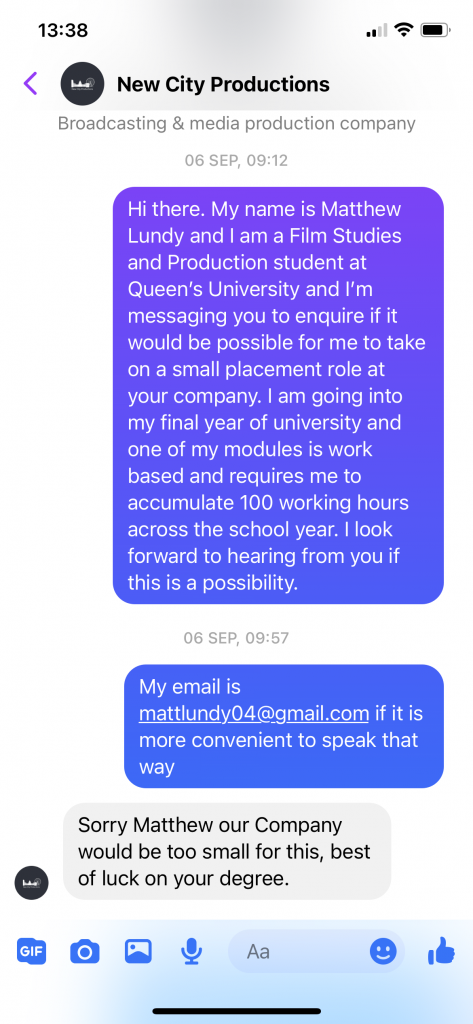
Securing a placement started out like most others would, finding people to get in touch with. My first contact was with representatives of NI Screen, who had facilitated a program that I participated in earlier in the year called the ‘Set Ready Program’. Given that NI Screen are well versed in what productions are happening in Northern Ireland I thought they would be my best chance of securing a placement, but to no avail. Then I got in touch with writer/director Declan Lawn to see if I would be able to shadow him. This was also unsuccessful, but he provided me other places to contact.
After these initial engagements I got in contact with as many production companies that I could find. I opted to directly call those I could, having been advised this often shows more desire for a role. For most however I was sending and emails with my CV and relevant experience I had and text messages as well (Fig. 2). Some options were provided by my university, others I sought out myself. All the companies I contacted had already offered placements, never responded or simply were not able to facilitate a placement.
So What?
Admittedly I did not begin an extensive search until one month before the set deadline so I needlessly put pressure on myself to secure it, which may have come across in my approach to many of the people I contacted. My belief that I would be unwilling to find a placement where I could be actively involved stunted my willingness to look at a broader range of options. I was looking solely at how I can enter the film industry and not consider the idea of finding something that would allow me to put my skills to use. Ultimately, I landed the placement after talking about the situation with one of my friends, who is a musician and he pointed me in the direction of the placement provider I now have.
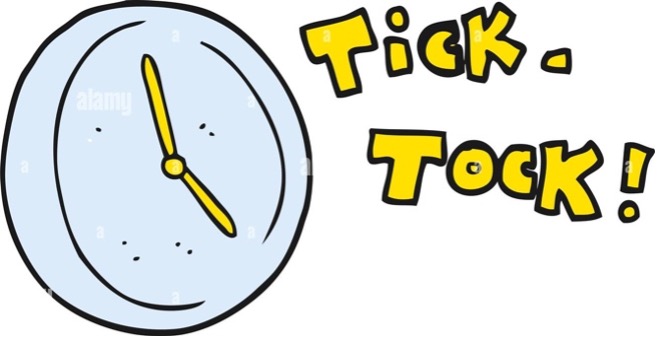
Now What?
In my placement I have an opportunity to use and improve my abilities in cinematography, sound recording and editing. This is something I didn’t think I would get the opportunity to do. For the future I will look to think more broadly about what I would truly like to get out of any experience I get and not limit myself to preconceived expectations. When looking for opportunities in the future I have gained first-hand experience in the importance in talking with as many people as possible. I never know who may be able to help me in finding solutions to any issues.
Starting a more thorough search much earlier in securing a placement would have saved me a lot of stress. Going forward it is more apparent than ever how important it is to give myself enough to time to complete my goals and ensure I am happy with the outcome. It turned out to be mostly luck that I have secured a placement that I am happy with.
Conclusion
I saw Borton’s model of reflection relevant in finding a placement, encouraging me to be succinct in my thinking and to ask questions of myself. Using this model, I simply laid out the facts of the events of my experience, making them clear to analyse in what went wrong and what I did right. Reflecting with this model thus allows me to apply what I have learned with a level of simplicity that I don’t believe I would have found with other reflective ideas. As Amanda Wain (2017) states in reference to Ruth Helyer (2015), “Reflection provides a structure in which to evaluate learning … fostering continual thought and innovation”. Using the reflection, I have taken with this model I can continue in my placement with the same ideas in attempting to get the most out of the experience and rewarding Sean with his faith in giving me the opportunity.
Bibliography
Borton, T. (1970) Reach, Touch and Teach. London: Hutchinson
Brooks, R. and Youngson, P.L., 2016. Undergraduate work placements: an analysis of the effects on career progression. Studies in Higher Education, 41(9), pp.1563-1578.
Helyer, R., 2015. Learning through reflection: the critical role of reflection in work-based learning (WBL). Journal of Work-Applied Management, 7(1), pp.15-27.
Wain, A., 2017. Learning through reflection. British Journal of Midwifery, 25(10), pp.662-666.
Run(ner) of the Mill
So Far So Good
You May Also Like

The Pen Is Mightier Than The Sword
24 November 2022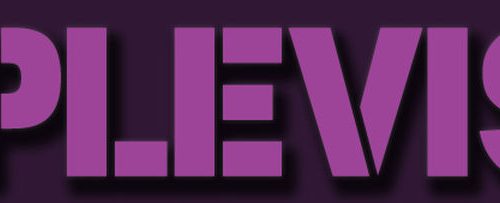
Securing My Placement: The Humbling Experience of Film Industry Rejection
24 November 2022